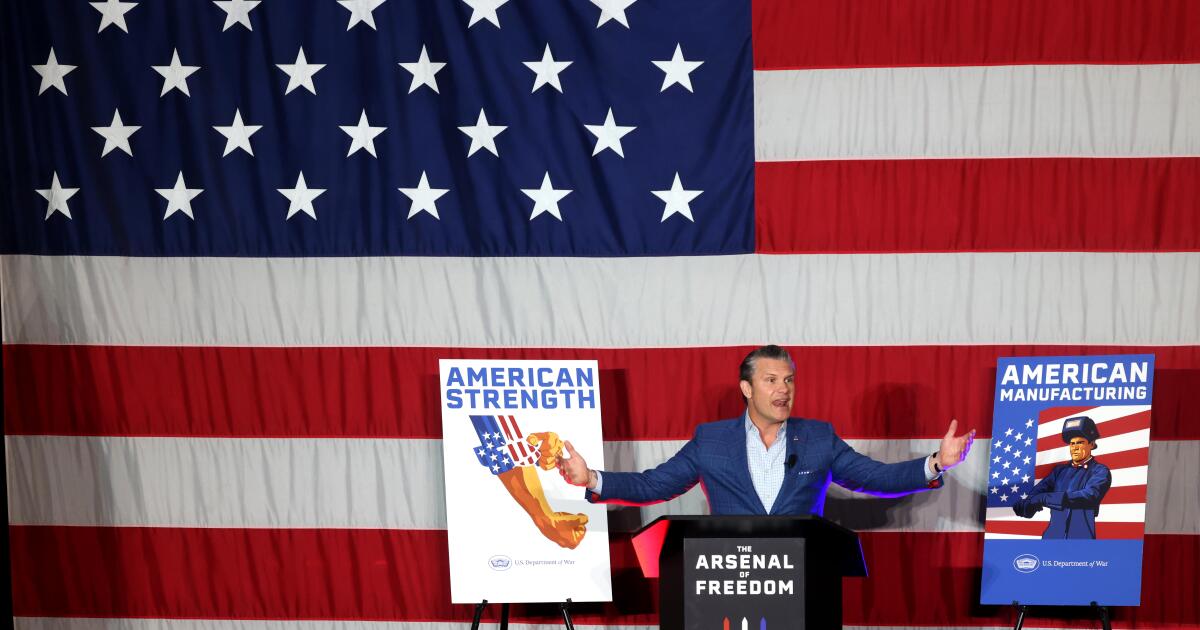Secretary of Defense Pete Hegseth tours Long Beach rocket factory
Secretary of Defense Pete Hegseth, who is taking a tour of U.S. defense contractors, on Friday visited a Long Beach rocket maker, where he told workers they are key to President Trump’s vision of military supremacy.
Hegseth stopped by a manufacturing plant operated by Rocket Lab, an emerging company that builds satellites and provides small-satellite launch services for commercial and government customers.
Last month, the company was awarded an $805-million military contract, its largest to date, to build satellites for a network being developed for communications and detection of new threats, such as hypersonic missles.
“This company, you right here, are front and center, as part of ensuring that we build an arsenal of freedom that America needs,” Hegseth told several hundred cheering workers. “The future of the battlefield starts right here with dominance of space.”
Founded in 2006 in New Zealand, the company makes a small rocket called Electron — which lay on its side near Hegseth — and is developing a larger one called Neutron. It moved to the U.S. a decade ago and opened its Long Beach headquaters in 2020.
Rocket Lab is among a new wave of companies that have revitalized Southern California’s aerospace and defense industry, which shed hundreds of thousands of jobs in the 1990s after the end of the Cold War. Large defense contractors such as Northrop Grumman and Lockheed Martin moved their headquarters to the East Coast.
Many of the new companies were founded by former employees of SpaceX, which was started by Elon Musk in 2002 and was based in the South Bay before moving to Texas in 2024. However, it retains major operations in Hawthorne.
Hegseth kicked off his tour Monday with a visit to a Newport News, Va., shipyard. The tour is described as “a call to action to revitalize America’s manufacturing might and re-energize the nation’s workforce.”
Long Beach Mayor Rex Richardson, a Democrat who said he was not told of the event, said Hegseth’s visit shows how the city has flourished despite such setbacks as the closure of Boeing’s C-17 Globemaster III transport plant.
“Rocket Lab has really been a superstar in terms of our fast, growing and emerging space economy in Long Beach,” Richardson said. “This emergence of space is really the next stage of almost a century of innovation that’s really taking place here.”
Prior stops in the region included visits to Divergent, an advanced manufacturing company in aerospace and other industries, and Castelion, a hypersonic missile startup founded by former SpaceX employees. Both are based in Torrance.
The tour follows an overhaul of the Department of Defense’s procurement policy Hegseth announced in November. The policy seeks to speed up weapons development and acquisition by first finding capabilities in the commercial market before the government attempts to develop new systems.
Trump also issued an executive order Wednesday that aims to limit shareholder profits of defense contractors that do not meet production and budget goals by restricting stock buybacks and dividends.
Hegseth told the workers that the administration is trying to prod old-line defense contractors to be more innovative and spend more on development — touting Rocket Lab as the kind of company that will succeed, adding it had one of the “coolest factory floors” he had ever seen.
“I just want the best, and I want to ensure that the competition that exists is fair,” he said.
Hegseth’s visit comes as Trump has flexed the nation’s military muscles with the Jan. 3 abduction of Venezuelan President Nicolás Maduro, who is now facing drug trafficking charges to which he has pleaded not guilty.
Hegseth in his speech cited Maduro’s capture as an example of the country’s newfound “deterrence in action.” Though Trump’s allies supported the action, legal experts and other critics have argued that the operation violated international and U.S. law.
Trump this week said he wants to radically boost U.S. military spending to $1.5 trillion in 2027 from $900 billion this year so he can build the “Dream Military.”
Hegseth told the workers it would be a “historic investment” that would ensure the U.S. is never challenged militarily.
Trump also posted on social media this week that executive salaries of defense companies should be capped at $5 million unless they speed up development and production of advanced weapons — in a dig at existing prime contractors.
However, the text of his Wednesday order caps salaries at current levels and ties future executive incentive compensation to delivery and production metrics.
Anduril Industries in Costa Mesa is one of the leading new defense companies in Southern California. The privately held maker of autonomous weapons systems closed a $2.5-billion funding round last year.
Founder Palmer Luckey told Bloomberg News he supported Trump’s moves to limit executive compensation in the defense sector, saying, “I pay myself $100,000 a year.” However, Luckey has a stake in Anduril, last valued by investors at $30.5 billion.
Peter Beck, the founder and chief executive of Rocket Lab, took a base salary of $575,000 in 2024 but with bonus and stock awards his total compensation reached $20.1 million, according to a securities filing. He also has a stake in the company, which has a market capitalization of about $45 billion.
Beck introduced Hegseth saying he was seeking to “reinvigorate the national industrial base and create a leaner, more effective Department of War, one that goes faster and leans on commercial companies just like ours.”
Rocket Lab boasts that its Electron rocket, which first launched in 2017, is the world’s leading small rocket and the second most frequently launched U.S. rocket behind SpaceX.
It has carried payloads for NASA, the U.S. Space Force and the National Reconnaissance Office, aside from commercial customers.
The company employs 2,500 people across facilities in New Zealand, Canada and the U.S., including in Virginia, Colorado and Mississippi.
Rocket Lab shares closed at $84.84 on Friday, up 2%.
